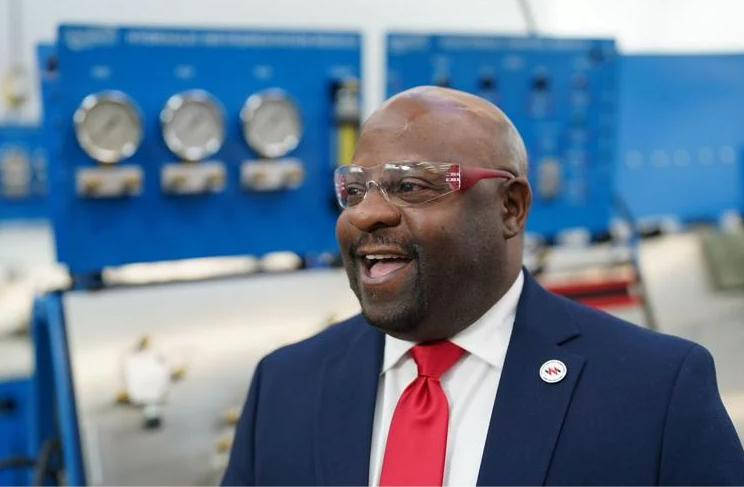Five years ago, Northland Workforce Training Center was a fledgling Buffalo Billion program, part of the redevelopment of a former industrial plant on Northland Avenue on Buffalo’s long-neglected East Side.

Q&A: STEPHEN TUCKER ON THE FUTURE OF MANUFACTURING, TECH TRAINING
02.27.24
Story originally published February, 2024 via The Buffalo News
By Janet Gramza
Photos by Derek Gee
The project brought in a Cincinnati workforce development expert, Stephen Tucker, to oversee the training center, aimed at helping East Side residents underrepresented in industry and education move into well-paying jobs fueling Buffalo’s manufacturing and tech rebirth.
Today, the program is a model for industry-driven training that Tucker is working to expand.
Q: Has Northland lived up to its goals?
A: We’re 5 years old and we’ve done a good job of implementing our model, which basically combines intentional outreach and recruitment to our community, especially the East Side community, the African-American community, with industry-driven training courses. I don’t know much about some of these subjects we are teaching — I don’t know CNC machining or electrical or welding or mechatronics – but that’s why we partner with SUNY — Alfred State College, one of the highest-rated programs in the country in terms of colleges of technology. That’s why we partner with (SUNY Erie Community College) on our mechatronics program.
At Northland, our team does the outreach. We do the recruiting. We have the credibility in the community. We are able to get the people into the programs, and we also provide the wraparound services — assistance with child care, mental health, substance abuse, housing, food and mentoring to help students complete their program.
Then we place them in a job, and right now our placement rate is 82%. So when you collaborate with these partners to launch the programs, you get the results that that we’ve gotten, which is a 62% graduation rate, double the national average, and 82% job placement.
In five years we’ve enrolled more than 1,000 students. We have over 400-some graduates and most of them placed in jobs whose average starting salary is $41,000 a year.
Q: So now you’re looking to scale, and you have a new strategic plan in the works – what does that look like?
A: We want to build our infrastructure to make sure that we can support our growth.
Our new plan will include things like ramping up our on-site human resources, implementing a customer relationship management system, developing an intranet. We want to build on our infrastructure, scale our impact and results and focus on financial sustainability.
In the next five years, we are going to increase our enrollment from 300 to 500, which is a 60% increase. In response to industry employment needs, we plan to launch a one-year Certificate in Clean Energy technician program taught by Alfred State and two new programs offered by SUNY Erie: a one-year auto technician certificate and a one-year Heating Ventilation and Air Conditioning certificate.
In addition, in response to both employer and student feedback, we will design, develop and administer our own customized short-term training programs here at Northland. While still focused on the advanced manufacturing and clean-energy sectors, these programs will provide a more ready pathway to employment while also being a feeder for our more intensive one and two-year offerings.
Q: How will you increase funding to expand these programs and services?
A: We measure our economic impact at $42 million, based partly on our graduates’ salaries, and we expect that to grow to more than $500 million in the next five years.
But providing students with low to no-cost training and extensive wraparound services can only be sustained with ongoing financial support. That starts with the employers who benefit directly from hiring our graduates. So our programs will need to be increasingly funded by employers in the advanced manufacturing, clean energy and related sectors.
Support from the Ralph C. Wilson Jr. Foundation has been, and will continue to be, critical to our success. But now that we have a proven track record, we will be reaching out to other foundations and funders, regionally and nationally, as well as launching community giving campaigns and other fund-raising events. We also will be looking to start an endowment fund like those at other educational institutions.
Q: You are also forming a new WNY coalition to increase your partnerships by a lot. How is that going?
A: It’s called the Western New York Manufacturing and Tech Workforce Coalition, and right now we have 13 members including Northland, Jamestown Community College, the Buffalo Center for Arts and Technology, Trocaire College and several others.
Our mission will be to align education with business, to build career pathways to train the region’s workforce, to raise awareness around advanced manufacturing and technology jobs and to support and fill open job opportunities.
Because no one organization can fill the thousands of jobs that are opening up in manufacturing and clean energy, it’s going to take a coalition approach, a collective impact approach, all of us working together. Collectively, we’ll be able to develop pipelines to fill these positions for the future.
